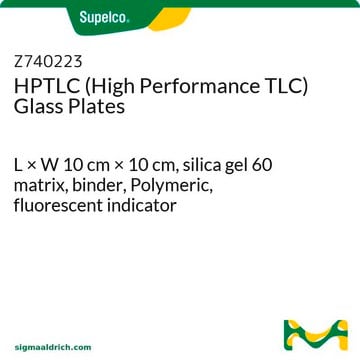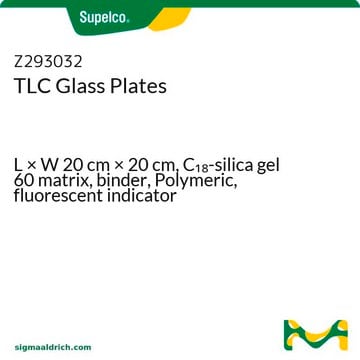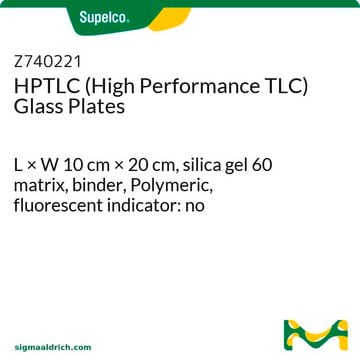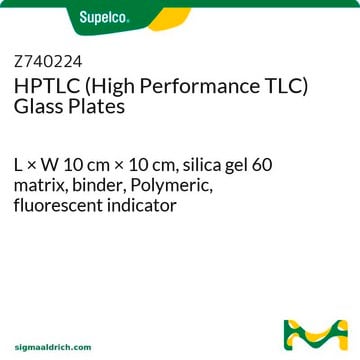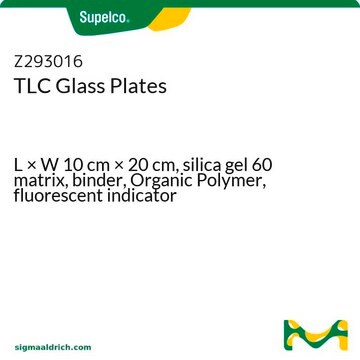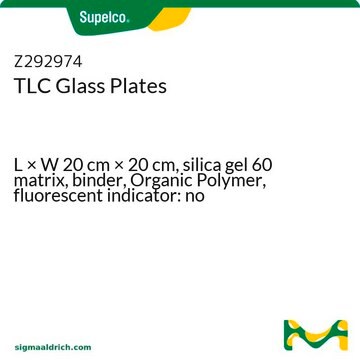Z740220
HPTLC (High Performance TLC) Glass Plates
L × W 10 cm × 20 cm, silica gel 60 matrix, binder, Polymeric, fluorescent indicator
Synonym(s):
High-performance Thin-layer Chromatography Glass Plates
About This Item
Recommended Products
material
glass support
silica gel 60 matrix
feature
binder Polymeric
fluorescent indicator
packaging
pkg of 50 ea
manufacturer/tradename
EMD Millipore® 1.05642.0001
technique(s)
HPTLC: suitable
thin layer chromatography (TLC): suitable
L × W
10 cm × 20 cm
layer thickness
200 μm
particle size
10-12 μm
pore size
60 Å pore size
Looking for similar products? Visit Product Comparison Guide
Application
- Pharmaceutical Analysis: HPTLC glass plates are widely used in the pharmaceutical industry for the quality control and analysis of active pharmaceutical ingredients (APIs) and their impurities. Recent research highlights the development of an HPTLC method for the estimation of piperine in Piper species and marketed formulations. This application is crucial for ensuring the quality, safety, and efficacy of pharmaceutical products (Balekundri et al., Green Analytical Chemistry, 2024).
- Environmental Monitoring: HPTLC glass plates are used in environmental studies to detect and quantify pollutants in water, soil, and air samples. The plates′ robustness and reproducibility are crucial for monitoring environmental contaminants and assessing pollution levels. Advanced HPTLC methods utilizing these plates contribute to effective environmental protection and regulatory compliance (Akpomie et al., International Journal of Environmental Analytical Chemistry, 2024).
- Food and Beverage Analysis: In food safety analysis, HPTLC glass plates are employed to detect residues of contaminants such as pesticides, mycotoxins, and food additives in various food products. The high sensitivity and specificity of the plates ensure accurate quantification, making them indispensable for routine food safety monitoring and quality control (Gokbulut, Current Analytical Chemistry, 2021).
- Herbal Medicine and Natural Products: HPTLC glass plates are extensively used in the analysis of herbal medicines and natural products. They enable the simultaneous separation and quantification of multiple compounds, facilitating the quality control and standardization of herbal formulations. Research has demonstrated their application in fingerprinting and quantifying essential oils and other bioactive compounds in medicinal plants (Naik and Sellappan, Analytical Chemistry Letters, 2020).
- Method Development and Validation: The use of HPTLC glass plates in method development and validation is essential for ensuring the accuracy and reliability of analytical results. These plates allow for the optimization of chromatographic conditions, improving the efficiency and robustness of analytical procedures. Recent advancements in HPTLC have focused on developing eco-friendly and sustainable analytical methods, contributing to greener practices in analytical chemistry (Sharma et al., Analytical Chemistry Letters, 2021).
Legal Information
Certificates of Analysis (COA)
Search for Certificates of Analysis (COA) by entering the products Lot/Batch Number. Lot and Batch Numbers can be found on a product’s label following the words ‘Lot’ or ‘Batch’.
Already Own This Product?
Find documentation for the products that you have recently purchased in the Document Library.
Customers Also Viewed
Our team of scientists has experience in all areas of research including Life Science, Material Science, Chemical Synthesis, Chromatography, Analytical and many others.
Contact Technical Service
